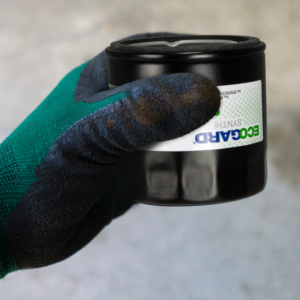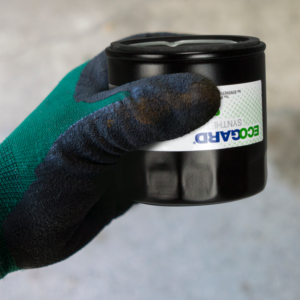
How to Boost Your Business With Increasing Oil Change Intervals
The historical standard of the 3,000 mile/3-month oil change interval remains commonplace in many areas even though it hasn’t been relevant for some time. Maintenance businesses such as quick lubes haven’t done much to dispel this standard either. Why would they? Less frequent oil change service equals fewer sales and a decrease in your bottom line – right?
Not necessarily. Professional installers can capitalize on the longer recommended oil change intervals enabled by higher quality oils. Here’s how…
It Starts with Consumer Education
Make sure that your customers know that new, high-quality motor oils will soon be the norm. Aggressive government regulations that push for increased fuel efficiency for passenger vehicle and light-truck applications mean that there is a greater need for motor oils that deliver when subjected to higher performance loads. In order to work with the new dimensions of protection for new engines, OEMs will need more robust lubricant options. The International Lubricants Standardization and Approval Committee (ILSAC) GF-6 Specification was born out of this need. The GF-6 Specification will be split into 2 sub-categories: GF-6A to address traditional viscosities and GF-6B to focus on greater fuel economy and certify lower viscosities. Confirmed by the Auto-Oil Advisory Panel (AOAP), the first license for ILSAC GF-6 oils is set to debut on April 1, 2018 – right around the corner.
It’s important to make sure customers understand that better-performing oils aren’t just for newer cars. Older model vehicles can also benefit from higher quality oils.
Create Scheduled Maintenance Packages
Over the last 20 years, software has made great strides in interface design, user experience, and the ability to manage large amounts of data. Because of these advancements, professional installers now have the tools necessary to properly align an oil change schedule with a vehicle’s maintenance service schedule. With innovative web-based tools such as, CSone, eLube, LubeSoft, Sage Microsystems, and many others – any installer is now able to offer a maintenance plan customized to suit individual customer maintenance needs.
Maintenance plans for each vehicle are determined by much more than simply the vehicle manufacturer’s recommended service interval. Industry studies have shown that the dirt-holding capacity of an oil filter, and therefore the needed service interval, is determined in large part by 1) the type of fuel being used in the vehicle, 2) the type of driving that is predominant for the vehicle and 3) the environment to which the vehicle is typically exposed. So, for example, if a vehicle is using bio-diesel fuel, the oil filter life is cut in half and must be serviced twice as often. If the vehicle is predominantly driven in “stop-and-go” traffic, carbon build up can reduce the life of the filter dramatically. Or, if the vehicle is exposed to an environment with excessive dust and debris in the air, the oil filter’s life will likely be reduced significantly as well. All of these things should be taken into consideration when determining the correct maintenance plan for the vehicle.
Once you have established a scheduled maintenance program for your customer, it is easy to boost your business by offering additional services such as wiper replacement, engine air filter replacement, or cabin air filter replacement along with an oil change.
Match the Filter to the Lubricant

We’ve already pointed out that the push for better-performing oils is at least in part due to the need to meet more stringent regulations on fuel economy and exhaust emissions. These two factors play a huge part in a vehicle’s environmental impact and it is therefore important that you, the professional installer, recommend the correct oil for your customer’s vehicle.
When selecting motor oil, keep in mind the simple but true idea of “matching the oil filter to the lubricant”. This means recommending a synthetic-media oil filter when performing an oil change service that calls for synthetic lubricants. Anything else is selling your customer short and not providing the protection that they deserve and are expecting with a synthetic lubricant service.

We’ve already pointed out that the push for better-performing oils is at least in part due to the need to meet more stringent regulations on fuel economy and exhaust emissions.

These two factors play a huge part in a vehicle’s environmental impact and it is therefore important that you, the professional installer, recommend the correct oil for your customer’s vehicle.
When selecting motor oil, keep in mind the simple but true idea of “matching the oil filter to the lubricant”. This means recommending a synthetic-media oil filter when performing an oil change service that calls for synthetic lubricants. Anything else is selling your customer short and not providing the protection that they deserve and are expecting with a synthetic lubricant service.
Build Customer Relationships
The use of higher quality oils that last longer, reduce emissions, and increase fuel economy shows customers that you’re cognizant of the impact that your business has on the environment. Your efforts in communicating the new options available to your customers will go a long way towards building strong relationships with your customers while boosting your bottom line.
Remember – match the filter to the lubricant and be sure to recommend add-on services for air filters, cabin air filters, fuel filters and wiper blades during regularly scheduled maintenance events with your customer. It’s time to adapt and get out in front of the changes that are coming. The service industry can’t afford hide from extended oil change intervals any longer. The motoring public is relying on the professional installer to provide the right lubricants, filters and wiper blades to protect their engine and to extend the life and safety of their vehicle – even if it means extended oil change intervals.
Share this entry